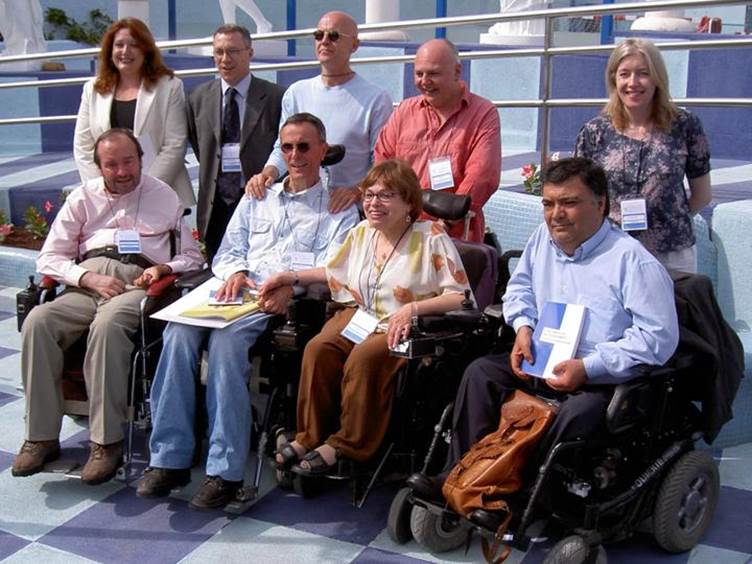Judy Heumann has left us

Presenters at the Tenerife Conference on Independent Living 2004 with Judy Heumann in the first row
Judy Heumann has left us.
The worldwide Independent Living and Disability Rights Movement has lost its most outspoken, powerful, and tireless spokesperson. Judy Heumann passed away on March 4, aged 75.
Judy was known worldwide for the clarity of her vision, charisma, and gift of making disability rights self-evident to everybody – from local grass-roots groups of disabled people to heads of state. An unafraid public speaker, she could be tough – if necessary. But I have never seen her insult or diminish anybody. Despite all her victories, she had no enemies. She cared for people and made them feel seen, heard, and remembered. That was one of the reasons for her achievements in thirty years of politics in Washington, DC, as Assistant Secretary at the US Department of Education under President Bill Clinton, as the first Special Advisor on Disability at the World Bank, and as “Disability Ambassatrice” in the State Department under President Barack Obama.
Before moving to Washington and working for the Federal Government, she had been running, together with Ed Roberts, the Center for Independent Living, Berkeley, the Mecca of disabled activists and organizers. They came from Europe, Asia, and Africa and spent enough time there to learn how to create something similar in their own country. With Ed Roberts and Joan Leon, she founded and directed the World Institute on Disability in Oakland, California, a think tank for research, argument, and policy formulation. In 1985, as a WID fellow in residence, I analyzed the Swedish community-based support services and proposed an entirely new type of service, which I called “personal assistance.” The best of the deal was to live in Judy’s house in Berkeley for four months, share meals, party, and travel with her. She was the hub of the legendary Berkeley disability community. Then, and on my many subsequent visits to Berkeley, I witnessed her endless stream of visitors from other countries, the many initiatives she started within and around the CIL and WID such as the Disability Rights Defense and Education Fund, her radio programs with the Berkeley KPFA station, the many people in academia, law, and politics who were proud to be her friend.
During the last few years, she worked at the Ford Foundation, wrote her autobiography, and built a rapidly growing community around her podcast, The Heumann Perspective, with a newsletter and interviews highlighting disability leaders and developments. She was the star of the Oscar-nominated documentary “Crip Camp,” which outlined the growth of the American Disability Rights Movement culminating in the implementation of the 1974 Rehabilitation Act and the Americans with Disabilities Act of 1990. She had an instrumental role in both.
Outside the US, Judy, through her positions in Washington, influenced the US government’s and donors’ foreign policy to support Independent Living initiatives in developing countries, often started by people who trained at Centers for Independent Living in the US. As I recall, at any international gathering, disabled people would swarm around Judy. She remembered everybody, their names, families, their circumstances. Everyone felt her special friend.
Judy made great use of her expertise as a community organizer, in disability politics, government agencies, and of her immense network linking people with each other for mutual benefit. She advised many national organizations, in and outside the US, in forming cross-disability coalitions and alliances with other civil society actors to impact national disability policy. Her skillful and humble way of offering suggestions at meetings often fascinated me.
Judy also had a role in founding ENIL, the European Network on Independent Living, from the initial idea to the conference in Strasbourg in 1989, which she attended. Since then, she has presented at the ENIL Freedom Drive in person and via video. Many national organizations in ENIL have sent delegations to the US, including meetings with Judy.
Judy and Ed Roberts were instrumental in importing the Independent Living and Disability Rights approach to Sweden. Both came to my conference in Stockholm in 1973 to present and were interviewed by Swedish TV. A direct outcome was the STIL pilot project, 1987 through 1989, based on my WID monograph, that tested my vision of personal assistance. In 1994, the Minister of Social Affairs, Mr. Bengt Westerberg, turned the vision into national law. STIL would invite Judy many more times for training and conferences.
Judy served on numerous NGO boards, including the Stockholm-based Independent Living Institute (since 2016). We will greatly miss her wisdom, counsel, and contacts.
I met Judy at the first GINI conference on Independent Living and under-ventilation in Chicago in November 1981, and we’ve been friends ever since. We were much more than collaborators. (All her friends say that!) Over the years, we shared personal matters, family stories, love relationships, medical problems, and fears. We could joke and fight, just like brother and sister. If I didn’t call her once a month, she’d call me just to talk about whatever was on our minds. She closed her last text message from the hospital with “your sister Judy.”
What can we learn from Judy? Not everybody can be as sharp and quick-witted as Judy was. But we all can try to cultivate kindness and understanding for other people – disabled or non-disabled, allies or opponents. Even the person who discriminates against us might be able to learn a new perspective – if given a chance. Confrontation may not always be the best strategy. Judy’s other lesson is friendship makes a difference. Working with friends is satisfying in itself. We will be more effective when we like what we do. Friendship is also a potent antidote against feeling victimized, which can easily cause burn-out. Let’s keep her memory alive by trying to follow Judy’s lessons.
Judy Heumann is survived by her dear husband Jorge Piñeda, and her brothers, Joseph and Ricky Heumann.
Adolf Ratzka, Stockholm

